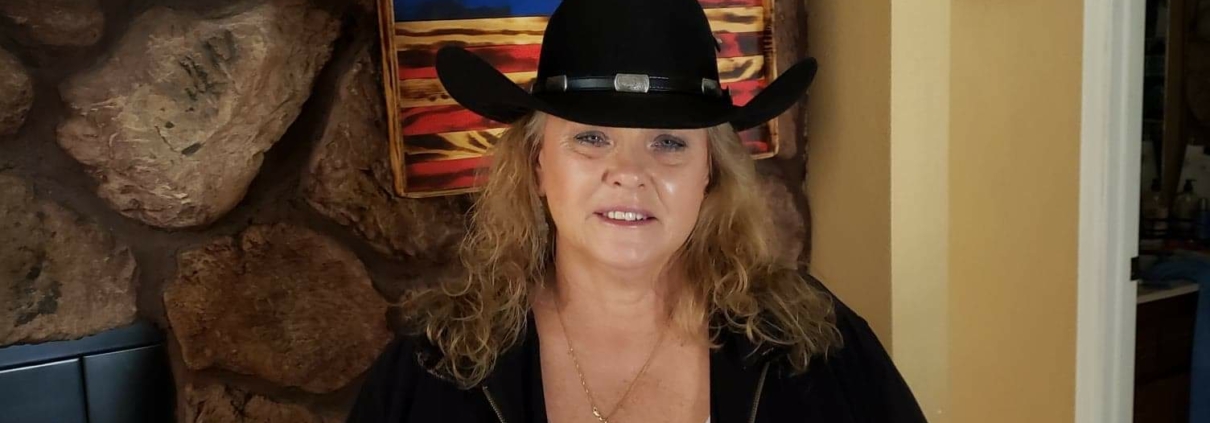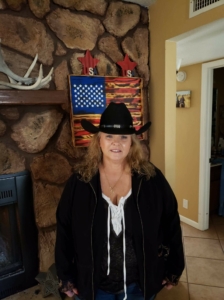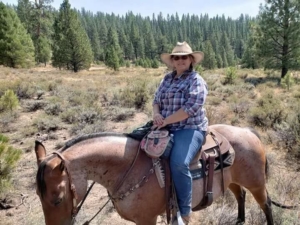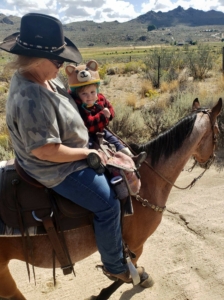Shari Lightfoot
One of the most joy-filled experiences for our staff occurs when a patient return to visit us on their own two feet. Recently, Shari Lightfoot provided the team at Rehabilitation Hospital of Northern Arizona with such a moment when she stopped by to thank us for the care and education she received.
Before admitting to RHNA, Shari lived a busy, independent life. “I have always been active. Not much could keep me down,” she noted. For most of her life, Shari cared for animals, especially horses. She was a barrel racer and a drill team member, enjoyed ice and roller skating, and participated in jousting. In addition, Shari raised a daughter, whom she assisted with many 4-H projects. “I have even wrestled steer to help with getting them branded,” she added.
One September day, that active lifestyle slowed dramatically while Shari and her husband were horse camping in Happy Jack, Arizona. They had a full but fun day. So when Shari felt a pull in her back later that evening, she assumed that she simply overdid it and that it would pass. After having dinner and playing cards, Shari went to lie down.
Two hours later, Shari had no control of her legs and was in extreme pain. She woke her husband, who called 911. Shari was medicated for her pain at the emergency room, but several tests couldn’t provide a definitive diagnosis.
Now weak and unable to walk, Shari needed help regaining her strength and mobility. “I needed a place that was willing to work with me and help me get back on my feet since I could not walk. RHNA was able to admit me from the [emergency department].”
Shari is grateful that the rehabilitation hospital gave her a chance and had a plan for her treatment. “Even though they did not have an official diagnosis for what was causing my leg weakness, right-sided deficits, and inability to walk, the staff at RHNA did not give up on me. They showed me tips as if I was a stroke patient, and that got me on my feet,” she recalled.
When considering what influenced her recovery most, Shari reflected on several factors. “There is a reason this is happening to me, and God will put the people I need in front of me to help me. And that was the staff at RHNA.”
“I wanted to get back to the lifestyle that I enjoyed,” Shari continued. I wanted to be there for my husband, who is critically ill. I worried about him so much. I wanted to get back to my family.”
Shari credits the RHNA staff for providing an incredible experience during her rehabilitation.
“The people at RHNA have such positive energy, and you can really tell they enjoy what they are doing. They don’t bring their personal baggage to work. They are professional, kind, and caring. They helped me to not leave here in a wheelchair, got me the extra time that I needed to recuperate, and I discharged walking out of there with a walker,” Shari shared.
“There were some staff members that really stuck out to me. First, Mark; Mark was very kind and empathetic to my pain. I felt safe with him whenever I heard his voice. Becky, I just cry when I think of her and what she did for me. She is just wonderful. She helped me spiritually, emotionally, and physically. The RNs really stuck up for my needs, especially the night shift. They provided me with warm blankets to help my nerves. It was very comforting,” Shari added.
“I want the staff to know that the tools they taught me have kept me walking. I still use what I learned at RHNA to this day,” Shari gratefully expressed. As part of her rehabilitation at RHNA, Shari used the Zero-G and pool therapy. Zero-G is a dynamic body weight support system that compensates for weakness and poor coordination, permitting intensive therapy while keeping the patient safe. “I was scared at first to use the Zero-G,” Shari noted. “But it gave me the confidence to trust my legs again and learn to walk.”
That scary September night was the culmination of over 30 years of symptoms for Shari. She continued to advocate for herself to get a definitive diagnosis. Finally, after seeking assistance at the Mayo Clinic, Shari received an official diagnosis of small fiber neuropathy.
Small fiber neuropathy is a neurological disorder where only the small sensory cutaneous nerves are affected.
“It can take years to get your diagnosis. I want people to keep pushing and going to the doctor until they find the diagnosis. Advocate for yourself,” she expressed. “I told my doctors at Mayo about the tools I learned at RHNA that have kept me on my feet and moving. My Mayo doctors encouraged me to continue using those tools learned.”
“It’s a struggle every day, but care enough about yourself to take care of yourself. Show people that you can make it,” Shari professed.
Shari looks forward to more traveling with her husband. She wants to help teach her granddaughter how to become a famous, professional barrel racer and share her love of horses.
Shari offered one additional piece of advice to anyone finding themselves in a similar situation. “It’s not easy. It’s not going to be easy when you’re down and you feel alone or isolated. Just remember, there are people who care even when you don’t feel like there isn’t someone who cares. This reminded me to stop, be my own advocate, and believe in myself.”








Leave a Reply
Want to join the discussion?Feel free to contribute!